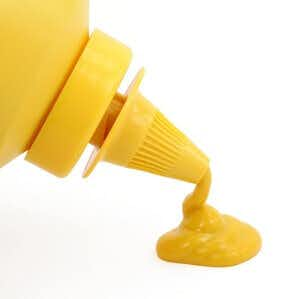
Q. I have been taking a daily tablespoon of yellow mustard for muscle cramps. It seems to be helping, but I wonder if the mustard may alter the effectiveness of my Coumadin (warfarin) blood thinner.
A. We suspect that one reason yellow mustard eases cramps is the turmeric it contains. That is the spice that makes mustard yellow.
Yellow Mustard Eases Cramps For Many
We have heard from a large number of people that yellow mustard is surprisingly effective and fast at relieving muscle cramps. Here are just a few stories.
E.M.
“Yes, mustard VERY much works! And seemingly in seconds! I love it and keep packets in my frig and eat a whole one (not the package, just the mustard!).
“They’re easy to get at fast food places; then you can carry several on trips. Whatever it is…I’m happy it works!”
Kate
“I just want to add my name as another who experiences quick and complete relief from very painful leg cramps after ingesting just a tablespoon of mustard. Amazing and wonderful!”
Don in Idaho
“Regarding mustard for cramps…recently I’ve been on a combination of medications that add to muscle cramping problems – in legs, feet, outer wall of stomach muscle, even neck muscles….and each and every time I swallow a tablespoon or two and within 5 minutes or so, all muscle spasms/cramps are gone. Dill pickle juice works too, but not as well as the yellow mustard.”
Erin
“My mother has eaten a teaspoon of mustard for leg cramps for years, and it works almost immediately on all but the worst thigh cramps; she keeps a bottle by her bed for this purpose. I passed this suggestion on to another elderly family member who is now a believer.”
Ruth
“I have had leg cramps for several years, sometimes serial. Once I had 9 separate spasm in the same night. The usual walking, stretching, rubbing with muscle rub, all worked but took a long time.
“After reading about mustard, I tried it. It’s hard to take though, but so effective that it’s worth it. Takes about 2 minutes; no walking necessary. I used brown mustard since I like it better than the standard mustard.”
We could share more stories but by now you get the idea that yellow mustard eases cramps for some people. Of course no remedy works for everyone and there are others who tell us that they prefer another approach. Should you be interested in some other remedies, here is a link to our Guide to Leg Pain.
Turmeric and Warfarin: A Deadly Combination?
We’ve heard from other readers that turmeric or its active component curcumin can increase the risk of bleeding in people taking warfarin or other anticoagulants.
James
“I take Coumadin (warfarin) and added turmeric to my regimen and within a couple of weeks my INR went to a critical 9+. The doctor called me at work to tell me of the danger. DON’T take the two together!”
Anonymous
“Turmeric increases the anticoagulant effect of Coumadin. I have been on Coumadin for 15 years because of an artificial aortic valve.
“I had read that turmeric was effective in lowering cholesterol and began sprinkling it on broccoli. My INR went up dramatically and my pharmacist said, ‘STOP!'”
Anonymous
“When I went in for a routine blood test my doctor told me that my blood, which should be between 2 and 3, was extremely thin at 13. I was told to come in immediately for a Vitamin K shot to reverse this effect.”
J.M.
“I am taking warfarin. I had an elevated INR after having two meals of curry in an Asian restaurant. I discovered the advice not to consume turmeric in a book by the Peoples Pharmmacist concerning food and natural remedies. I think this is what caused the INR elevation. I belong to Kaiser and told their Coumadin Clinic after I had stopped eating curry and had a normal result, but the person there (probably a pharmacist) did not agree and said I could consume curry, since it was probably a small amount.”
The potential interaction between curcumin and warfarin has not been well established by researchers. Nevertheless, we think it is far better to err on the side of caution and limit exposure if you are taking this blood thinner. We don’t know how much turmeric is in the mustard you are using. We encourage you to monitor the blood tests your provider uses to regulate your warfarin dose.
To learn more about other food and drug interactions with warfarin, you may wish to download our FREE Guide to Coumadin Interactions.

